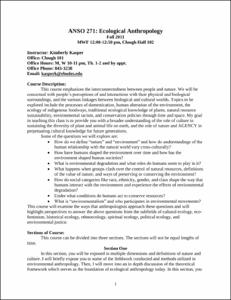Please use this identifier to cite or link to this item:
http://hdl.handle.net/10267/14772| Title: | ANSO 271-01, Ecological Anthropology, Fall 2011 |
| Authors: | Kasper, Kimberly |
| Keywords: | Anthropology and Sociology, Department of;Syllabus;Curriculum;Academic departments;Text;2011 Fall |
| Issue Date: | Aug-2011 |
| Publisher: | Memphis, Tenn. : Rhodes College |
| Series/Report no.: | Syllabi CRN;12105 |
| Abstract: | This course emphasizes the interconnectedness between people and nature. We will be concerned with people’s perceptions of and interactions with their physical and biological surroundings, and the various linkages between biological and cultural worlds. Topics to be explored include the processes of domestication, human alteration of the environment, the ecology of indigenous foodways, traditional ecological knowledge of plants, natural resource sustainability, environmental racism, and conservation policies through time and space. My goal in teaching this class is to provide you with a broader understanding of the role of culture in sustaining the diversity of plant and animal life on earth, and the role of nature and AGENCY in perpetuating cultural knowledge for future generations. Some of the questions we will explore are: How do we define “nature” and “environment” and how do understandings of the human relationship with the natural world vary cross-culturally? How have humans shaped the environment over time and how has the environment shaped human societies? What is environmental degradation and what roles do humans seem to play in it? What happens when groups clash over the control of natural resources, definitions of the value of nature, and ways of preserving or conserving the environment? How do social categories like race, ethnicity, gender, and class shape the way that humans interact with the environment and experience the effects of environmental degradation? Under what conditions do humans act to conserve resources? What is “environmentalism” and who participates in environmental movements? This course will examine the ways that anthropologists approach these questions and will highlight perspectives to answer the above questions from the subfields of cultural ecology, eco-feminism, historical ecology, ethnoecology, spiritual ecology, political ecology, and environmental justice. |
| Description: | This syllabus was submitted to the Rhodes College Office of Academic Affairs by the course instructor. |
| URI: | http://hdl.handle.net/10267/14772 |
| Appears in Collections: | Course Syllabi |
Files in This Item:
| File | Description | Size | Format | |
|---|---|---|---|---|
| 2011_fall_ANSO_271-01.pdf | 283.62 kB | Adobe PDF |  View/Open |
Items in DSpace are protected by copyright, with all rights reserved, unless otherwise indicated.